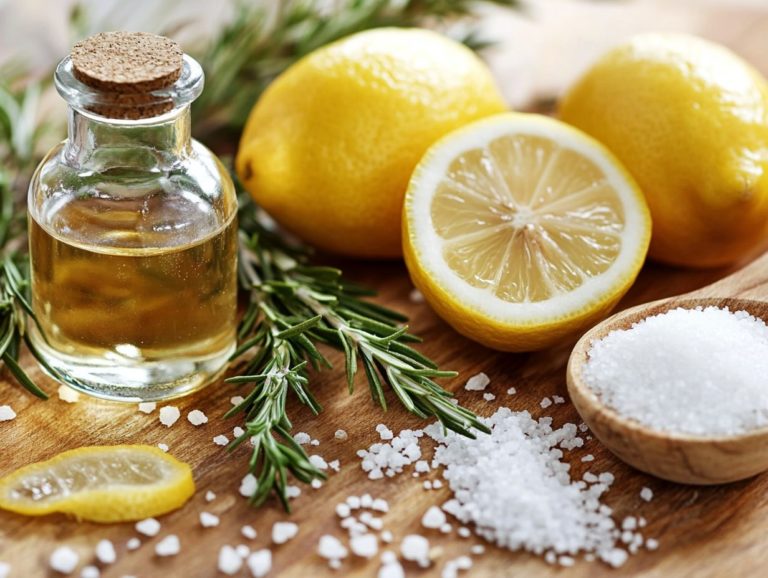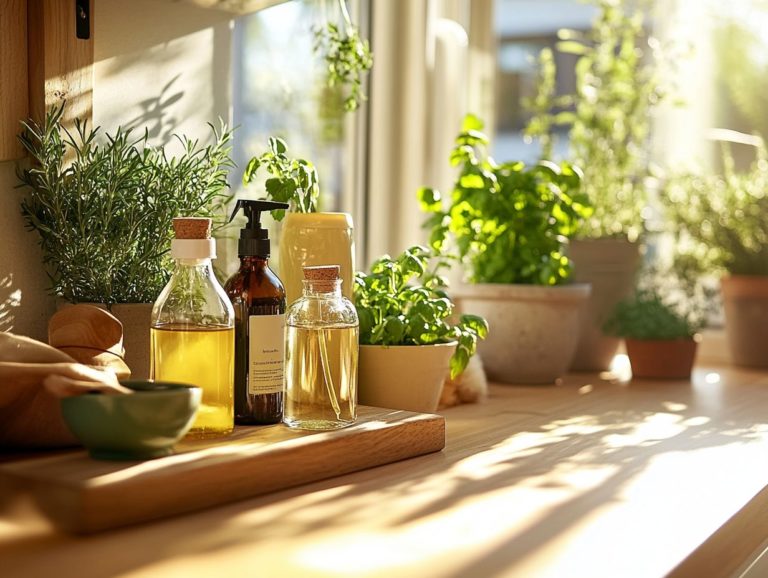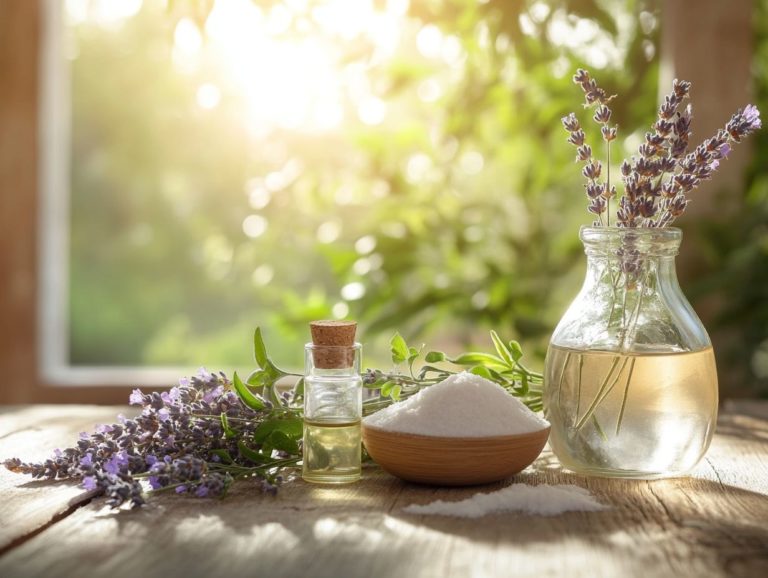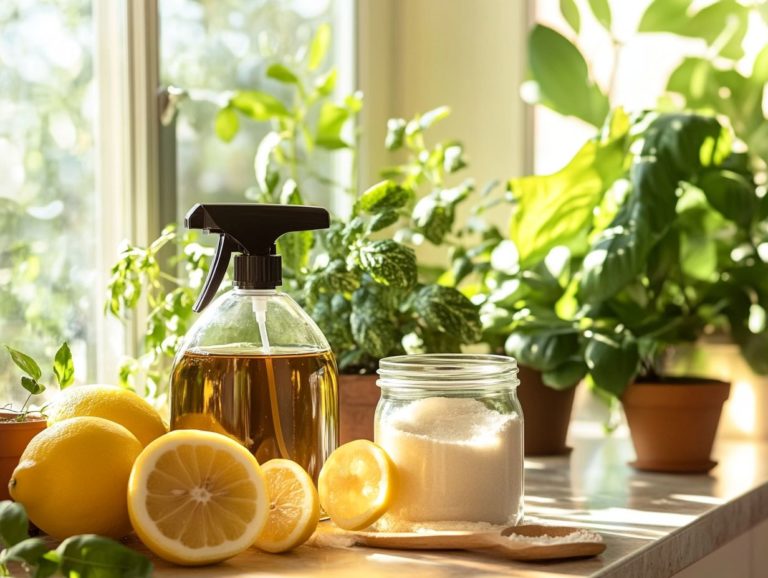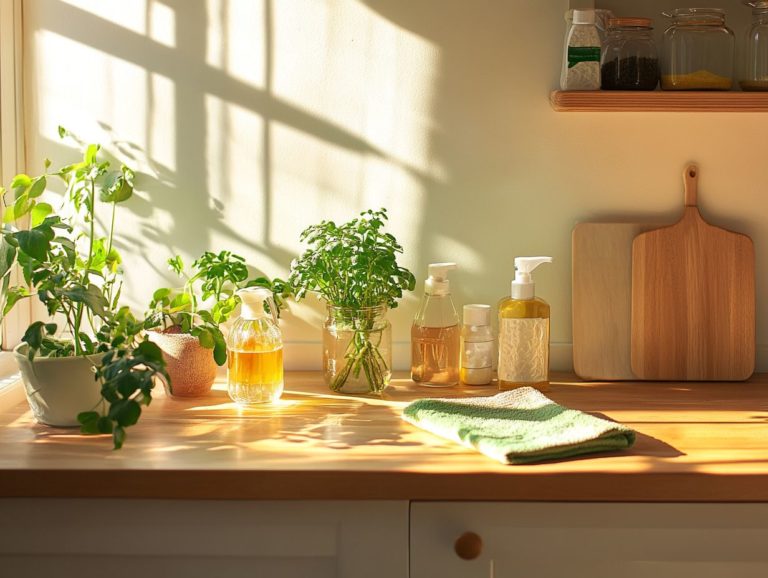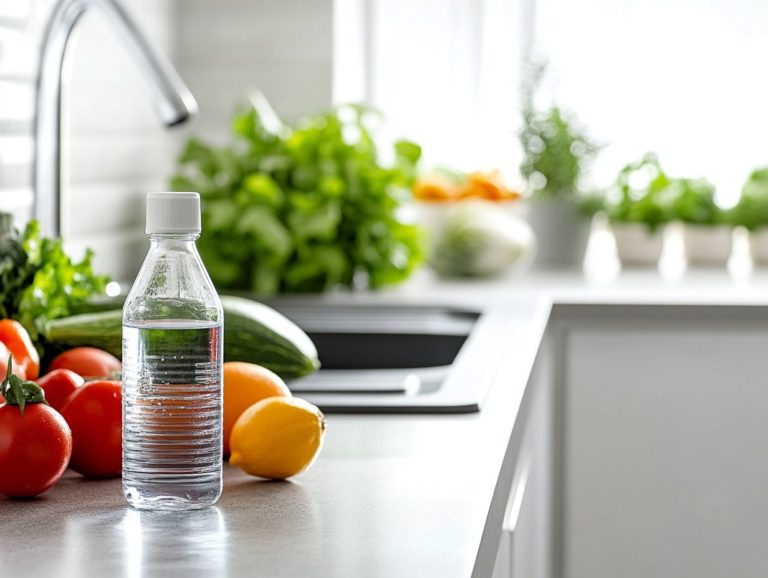5 Natural Ingredients to Avoid in Cleaning
When it comes to maintaining a clean home, you might find yourself reaching for commercial cleaning products, often unaware of the potential hazards hidden within their ingredients, such as toxic chemicals and synthetic dyes.
This article sheds light on five common components synthetic fragrances, ammonia, sodium lauryl sulfate, triclosan, and formaldehyde that could pose serious health risks, including allergic reactions, and adversely affect the environment.
You ll discover why it s wise to avoid these substances, learn how to identify them in everyday products, and explore natural alternatives that can help you create a safer, healthier living space.
Join the journey as you uncover the truth about what s really lurking in your cleaning supplies, from household cleaners to air fresheners!
Contents
Key Takeaways:
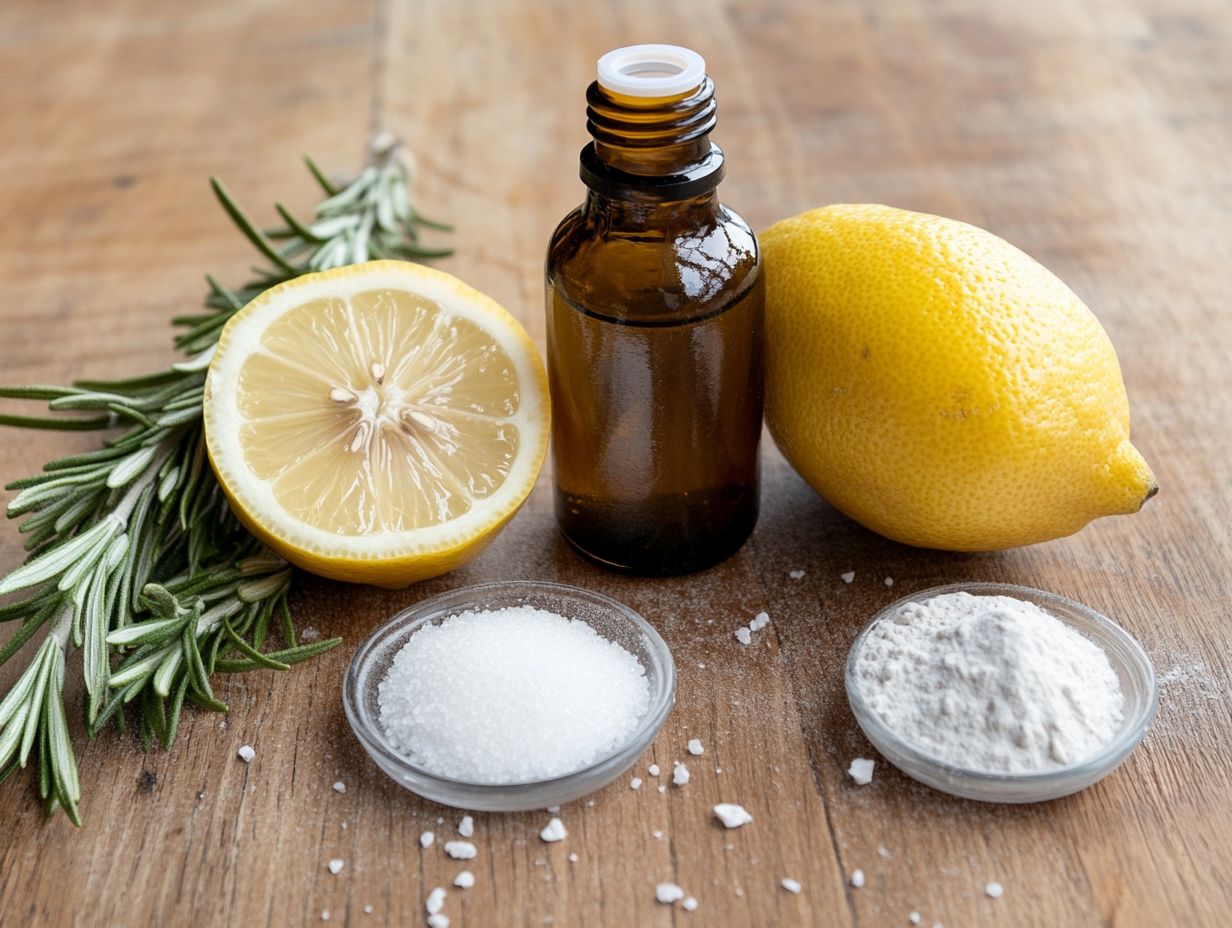
- Synthetic fragrances in cleaning products can contain harmful chemicals that can irritate the skin and respiratory system.
- Ammonia and sodium lauryl sulfate are commonly used in cleaning products, but can also be toxic to humans and the environment, contributing to various health issues.
- Triclosan and formaldehyde are known to have potential health risks and negative impacts on the environment, making them ingredients to avoid in cleaning products.
1. Synthetic Fragrances
Synthetic fragrances are found in many household cleaners and commercial products. They often hide toxic chemicals, which can cause health issues.
These issues include allergic reactions and respiratory problems, especially for vulnerable groups like toddlers.
Common synthetic fragrances in these products often consist of phthalates and benzene derivatives, both of which have been associated with hormone imbalances and potential long-term health repercussions. Even quaternary ammonium compounds found in some air fresheners can exacerbate these issues.
Great news! More people are discovering natural alternatives that are not only safe but also effective. You won t believe how refreshing they can be!
Brands like Seventh Generation, Method, and Mrs. Meyers are paving the way, utilizing plant-based ingredients and essential oils that deliver delightful scents without the harmful additives.
For you, the Environmental Working Group serves as a vital resource to assess the safety of cleaning products, guiding you toward informed choices that prioritize both health and environmental impact. By opting for products with natural fragrances, you not only shield your family from potential risks but also contribute to a healthier planet.
Brands like Honest Company and Green Works also support safer cleaning solutions.
2. Ammonia
Ammonia is a powerful cleaning agent often found in commercial cleaners, prized for its strong disinfectant properties. However, its intensity can pose significant health risks, especially when inhaled or when it comes into contact with your skin, potentially leading to respiratory issues and irritation.
Mixing ammonia with bleach can create toxic fumes that are extremely hazardous.
Amid the ongoing concern surrounding COVID-19 and SARS-CoV-2, many have turned to ammonia-based products, convinced they offer superior surface disinfection. It’s essential to recognize, though, that inhaling ammonia fumes can worsen lung conditions and lead to serious health complications.
If you’re looking for alternatives, there are numerous safer cleaning agents that effectively sanitize without the harsh side effects. For instance, hydrogen peroxide and borax are effective disinfectants that pose fewer health risks.
When selecting non-toxic cleaning products, keep an eye out for labels that indicate biodegradable ingredients, plant-based formulations, and certifications from reputable health and environmental organizations.
This approach allows you to maintain high hygiene standards while protecting your health and that of your loved ones.
Don’t wait! Make the switch to safer cleaning products today to protect your family and the planet!
3. Sodium Lauryl Sulfate
Sodium Lauryl Sulfate (SLS) is a common surfactant found in many cleaning products, such as surface cleaners and shampoos. It is known for its foaming prowess.
However, SLS can irritate the skin and may trigger allergic reactions. This raises concerns for those seeking safer, chemical-free alternatives.
Sodium hydroxide, another common ingredient, can also cause severe skin irritations. As you become more health-conscious, you probably scrutinize product ingredients.
SLS can strip the skin of its natural oils. This may lead to dryness and worsen conditions like eczema.
Reviewing ingredient lists before purchasing can help you avoid harsh chemicals. Many consumers now prefer brands that prioritize safety and sustainability.
Brands like 100% Pure and Method use botanical ingredients. They offer gentler, eco-friendly options free from SLS and other harmful chemicals.
By paying close attention to ingredient lists, you can make informed choices. This reflects your values and balances effectiveness with safety.
4. Triclosan
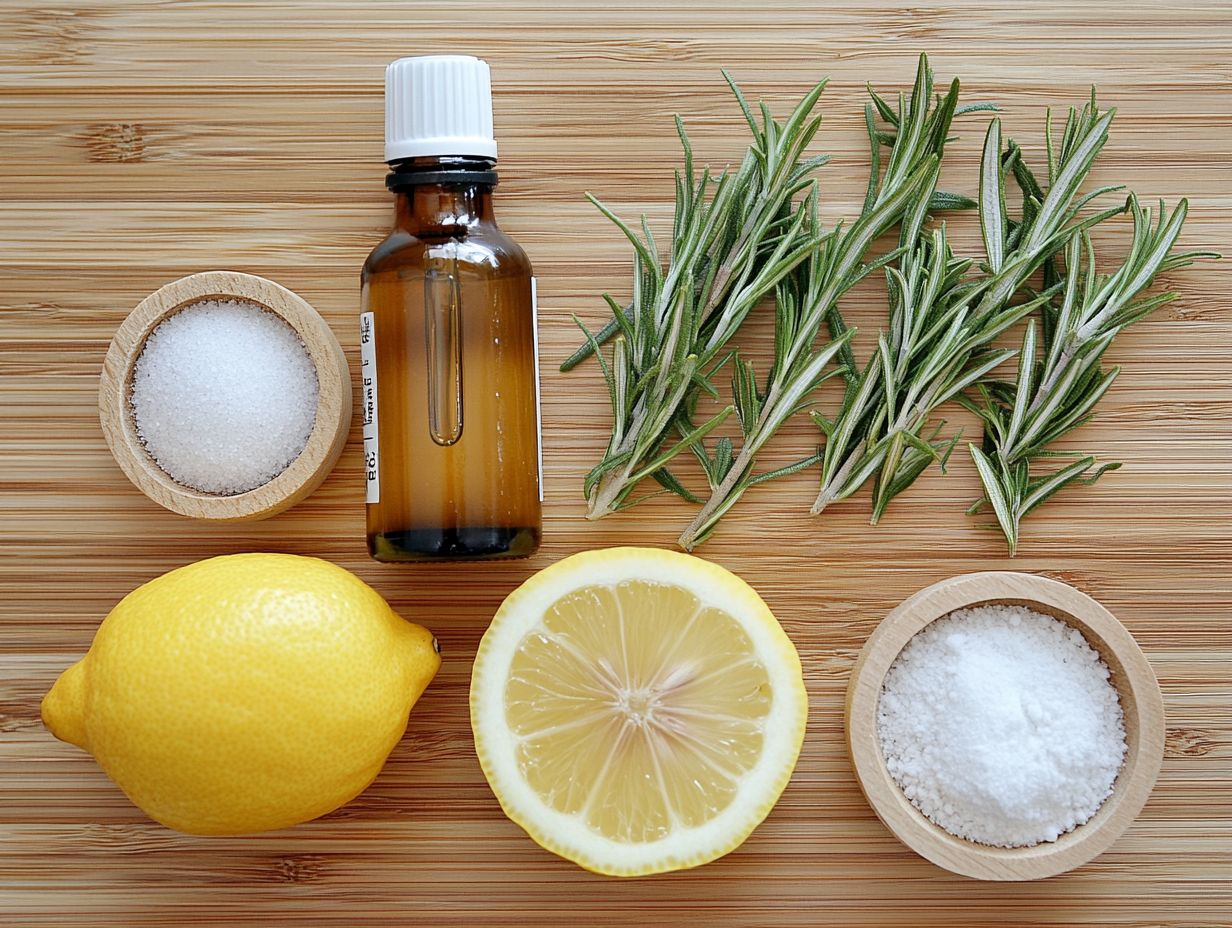
Triclosan is an antibacterial agent found in many disinfectants and household cleaners. It has sparked debate due to its health risks, including hormonal disruptions and the potential to fuel antibiotic resistance.
As awareness of these risks grows, many consumers seek natural alternatives. Options like vinegar, baking soda, and essential oils effectively disinfect without harmful substances.
This trend towards eco-friendly cleaning products highlights a desire for safer living spaces. Consumers increasingly choose formulations free from synthetic chemicals.
In response, businesses are creating innovative cleaning solutions that align with these values. This marketplace champions both effectiveness and sustainability.
5. Formaldehyde
Formaldehyde is a known carcinogen found in many cleaning products. It can lead to serious health issues, including respiratory problems and allergic reactions.
This alarming reality has increased demand for chemical-free alternatives in cleaning solutions. The formaldehyde in household cleaning items often comes from preservatives, disinfectants, and even fragrances released during use.
Exposure to formaldehyde can cause discomfort, with symptoms like coughing, watery eyes, and skin irritations. It’s crucial to check ingredient lists for harmful chemicals.
To protect your health, explore natural cleaning products with safe, non-toxic ingredients. Consider eco-friendly options like:
- Baking soda
- Vinegar
- Essential oils
These options deliver effective cleaning power while ensuring your home remains a safe haven for everyone.
Why Should You Avoid These Ingredients in Cleaning Products?
Avoid harmful ingredients like synthetic fragrances, ammonia, and formaldehyde in your cleaning products. This is crucial for maintaining a healthy home environment.
These toxic chemicals can lead to health issues and allergic reactions, especially for sensitive individuals like toddlers. Opting for natural cleaning products, such as those from Force of Nature, can significantly reduce these risks.
You ll often find these substances in common household cleaners. They can contribute to respiratory problems, skin irritations, and even long-term reproductive or developmental issues. It s vital to know what s in your cleaning products, as many people remain unaware of the potential dangers.
Organizations like the Environmental Working Group are instrumental in this regard, offering resources and databases that help you identify safer options.
By prioritizing natural alternatives and supporting companies that avoid toxic chemicals, you can reduce your exposure to harmful substances and create a safer living environment for you and your family.
What Are the Potential Health Risks Associated with These Ingredients?
The potential health risks linked to toxic chemicals in cleaning solutions can be alarming. They range from respiratory issues and skin irritation to long-term effects like hormonal disruptions and an increased risk of cancer. This is especially concerning for sensitive groups, such as toddlers and individuals with pre-existing health conditions.
The Environmental Working Group provides valuable information to help you choose safer alternatives. Regular use of conventional cleaning products intensifies these risks, often releasing volatile organic compounds (VOCs) into your indoor air, compromising air quality.
For instance, phenols, commonly found in disinfectants, can irritate your skin and respiratory tract. Prolonged exposure may harm your liver. While bleach effectively eliminates germs, it poses serious risks if inhaled or ingested, potentially damaging lung tissue or causing gastrointestinal issues.
Such pressing health concerns raise valid questions about the safety of these everyday products. Consumers like you are prompted to seek alternatives that reduce chemical exposure while still ensuring a clean environment. Eco-friendly brands like Archipelago and the Honest Company are excellent choices for safe and effective house cleaning.
What Are the Environmental Impacts of These Ingredients?
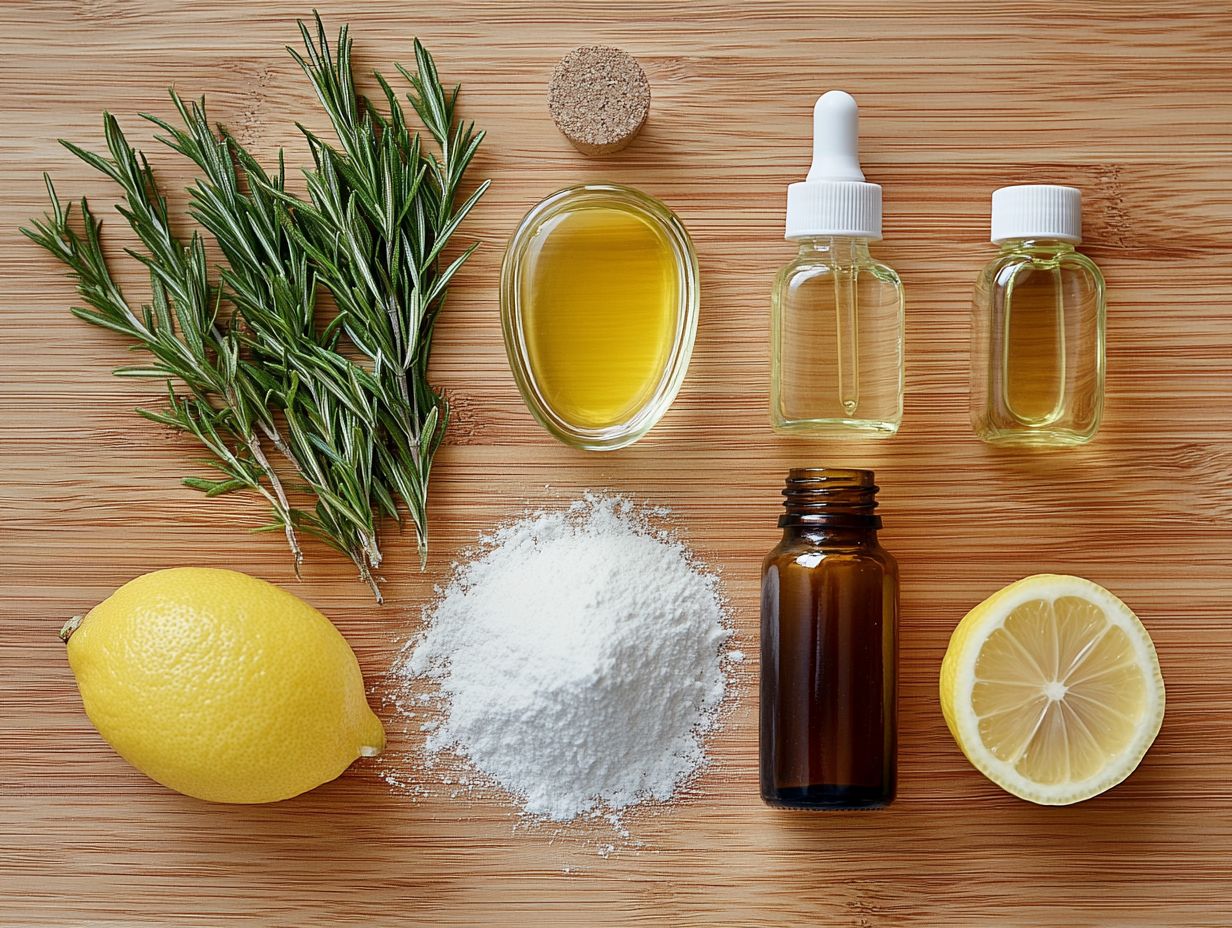
The environmental impacts of using harmful chemicals in cleaning products are significant. Ingredients like bleach and ammonia release VOCs that contribute to air pollution and negatively affect human health and the ecosystem.
The runoff from these cleaning agents can contaminate water supplies and harm aquatic life. Choosing eco-friendly cleaning solutions reduces these negative impacts, promoting a healthier planet.
Harmful chemicals in cleaning agents can contaminate water supplies, harm aquatic life, and contribute to air pollution. This makes it essential for you to choose chemical-free cleaning products that utilize natural ingredients and safe alternatives, helping to minimize ecological damage.
When harmful substances enter waterways, they disrupt aquatic ecosystems, leading to reduced biodiversity and the decline of vital species. The runoff from these cleaning products can accumulate in the soil, adversely affecting plant growth and wildlife.
On the other hand, opting for environmentally friendly cleaning alternatives from brands like Seventh Generation, Method, and Mrs. Meyers can protect water quality and promote healthier ecosystems.
Natural ingredients minimize pollution and break down more easily, reducing long-term environmental footprints. By prioritizing sustainable options from brands like Green Works, you can effectively contribute to a cleaner planet and ensure a safer habitat for both current and future generations.
What Are the Alternatives to These Harmful Ingredients?
You can choose safe alternatives to harmful ingredients in cleaning products by opting for natural cleaning solutions made from botanical ingredients. Think of staples like vinegar, baking soda, and hydrogen peroxide they’re not just for cooking; they effectively clean and disinfect without the health risks associated with synthetic chemicals, including concerns around SARS-CoV-2 and COVID-19.
By using these simple household items, you can whip up effective cleaning solutions for a range of tasks. For example, a straightforward mixture of vinegar and water works wonders as a glass cleaner. At the same time, baking soda tackles stubborn stains and unpleasant odors with ease.
If you prefer more convenient options, try out commercially available products like Force of Nature, which uses electrolyzed water a cleaning solution created by passing electricity through salt water, making it effective and safe. Also, check out offerings from the Honest Company and Archipelago, which emphasize safety and eco-friendliness.
Choosing these alternatives ensures a spotless home and contributes to a healthier environment, allowing you to breathe easier and live better. Don t wait start using these natural cleaning solutions today!
How Can You Identify These Ingredients in Cleaning Products?
Identifying harmful ingredients in cleaning products requires a careful look at the ingredient list. Many toxic chemicals often hide behind ambiguous names or proprietary blends, making it essential for you to remain vigilant and informed to avoid potential health risks.
By taking the time to carefully scrutinize these lists, you can safeguard yourself and your family from the harmful substances frequently lurking in everyday cleaning supplies. Familiarizing yourself with common hazardous chemicals, such as phthalates, formaldehyde, and sodium lauryl sulfate, enables you to recognize potential allergens and adverse reactions.
Utilizing resources like the Environmental Working Group’s comprehensive database can enhance your ability to make informed choices. This database provides detailed insights into the safety of various ingredients and their potential health effects, especially concerning SARS-CoV-2 and COVID-19. In this way, navigating the complex world of cleaning products transforms from a daunting challenge into a manageable endeavor.
What Are Some Natural and Safe Cleaning Solutions?
Natural and safe cleaning solutions include vinegar, baking soda, and essential oils. These remarkable ingredients deliver impressive cleaning power without the toxic chemicals typically found in conventional products, ensuring a healthier environment for you and your loved ones, particularly for sensitive individuals like toddlers.
These simple yet potent ingredients excel not just as stain removers and disinfectants, but they also work wonders in eliminating odors and purifying the air. For example, vinegar serves as a fantastic multi-surface cleaner that effortlessly cuts through grime. Meanwhile, baking soda acts as a gentle abrasive and deodorizer. Essential oils such as tea tree and lavender not only infuse your space with a delightful fragrance but also introduce antimicrobial properties into your cleaning routine.
If you re inclined to craft your own DIY cleaning solutions, a blend of vinegar and water in a spray bottle proves effective for tackling glass and countertop surfaces. Brands like Seventh Generation, Method, and Green Works offer a range of cleaning products that prioritize safety and environmental sustainability, making them commendable alternatives to traditional cleaners.
Frequently Asked Questions
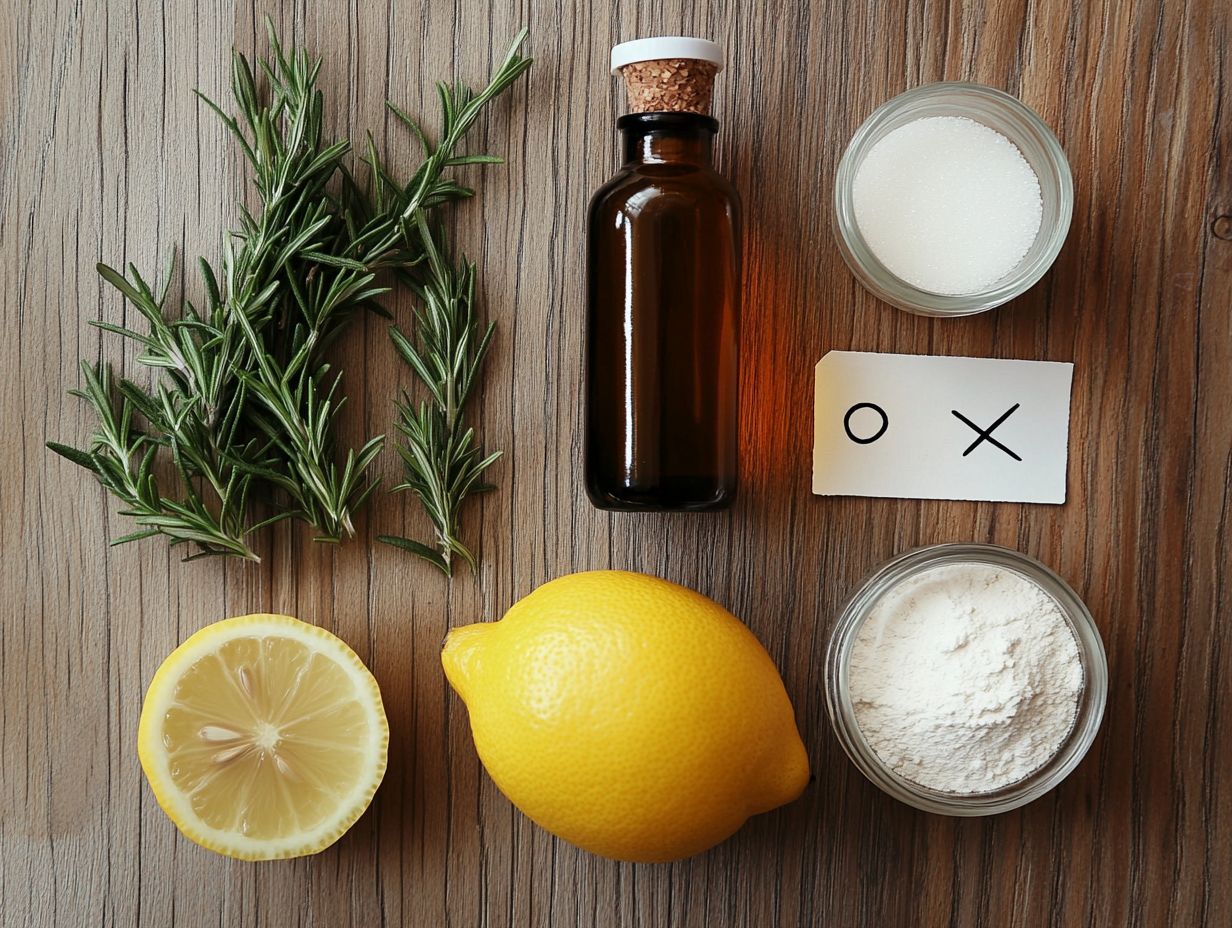
What are the five natural ingredients to avoid in cleaning?
The five natural ingredients to avoid in cleaning are vinegar, lemon juice, baking soda, essential oils, and hydrogen peroxide.
Why should I avoid using vinegar in cleaning?
Vinegar has acidic properties that may harm surfaces like marble and granite. Its strong smell can also be off-putting for some.
Is lemon juice safe to use in cleaning?
No, lemon juice should be avoided in cleaning as it can cause discoloration on surfaces and may also be corrosive on certain materials.
Can baking soda be harmful in cleaning?
Yes, baking soda can be abrasive and may scratch delicate surfaces. It can also leave a residue if not rinsed properly.
Are essential oils safe to use in cleaning?
Essential oils have natural cleaning properties.
However, they can be harmful if misused, causing skin irritation or being unsafe to ingest.
Why is hydrogen peroxide not recommended for cleaning?
Did you know hydrogen peroxide effectively kills germs?
It can also damage surfaces, as it can eat away at materials if not used carefully and should always be diluted.

